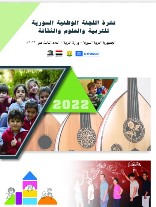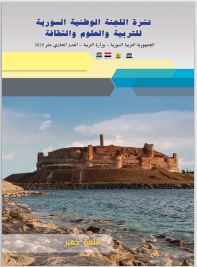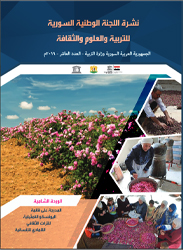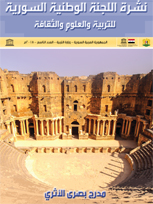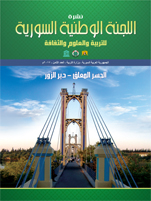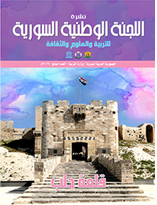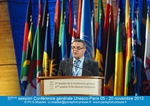A Virtual Workshop Entitled "Media Coverage and Misinformation about the Covid-19 Crisis"
|
The Ministry of Information, in cooperation with the UNESCO Regional Bureau in Beirut and the Syrian National Commission, held a virtual workshop entitled "Media Coverage and Misinformation about the Covid-19 Crisis" at exactly three o'clock on Monday, June 15th, 2020; with the participation of 51 journalists from all visual, written, audio, and electronic media, in the presence of:
- Mr. George Awad, Head of Communication and Information Programs at the UNESCO Bureau in Beirut. - Trainer Mrs. Roba El-Helou, a Lecturer in Media, a Coordinator of Gender Studies, Communication, and Global Movement and Political Science Studies at Notre Dame University in Lebanon. - Ammar Ghazali, Director of Developmental Information at the Ministry of Information. - Dr. Nidal Hassan, General-Secretary of the Syrian National Commission for UNESCO. The workshop aimed to provide an inquiry frame and lessons helping to deal with the increasingly ambiguous information environment, research the spread of "Fake News" as a term to discredit the press, and specify an alternative frame that covers disinformation and misinformation, especially the malicious information and emotional propaganda. The workshop began with a speech by Dr. George Awad, in which he thanked the Ministry of Information and the National Commission for the efforts that were exerted for the success of the workshop, and on the existing cooperation between them. Also, he emphasized that this cooperation is in the context of the long-standing partnership to support the media, female and male journalists and media professionals in their daily works and keep up with professional, technical, economic and social developments, and that the workshop is very necessary to keep up with the tremendous developments taking place in the world, and to allow the exchange of views and experiences in the light of misinformation and how to obtain information. Therefore, in the light of these tremendous developments and changes, UNESCO had to present the Arabic version of its booklet entitled "Journalism, Fake News, and Misinformation". It is a handbook for journalism education and training that targets journalism teachers and trainers, but it, also, has a direct interest to journalists, practitioners of the profession and others interested in understanding and combating misinformation, and this booklet will be discussed in this workshop to benefit from its information. Then Dr. Nidal Hassan, Secretary-General of the Syrian National Commission for UNESCO presented a speech in which he thanked Professor George Awad and colleagues at the UNESCO Bureau who facilitated the organizing of this activity, and through them he thanked H.E. Dr. Hamad bin Saif Al Hammami, the Director of the UNESCO Regional Bureau for Education in the Arab Countries for his interest in organizing this workshop with the media professionals in the Ministry of Information, and conveying the greetings of H.E. Mr. Mr. Emad Mouafak Al-Azeb, the Minister of Education, the Chairman of the Syrian National Commission for UNESCO to all participants and organizers, appreciating the efforts of the UNESCO's office in this field, stressing the continuous keenness of the National Commission to cooperate with UNESCO and benefit from the organization's expertise in all areas of specialization. He thanked, also, Mr. Emad Sarah - the Minister of Information, and Professor Ammar Ghazali - Director of Developmental Media, and all participants, and confirmed that the topic of the workshop is an important topic and the title is very valuable between transparency and credibility on one hand, and misinformation and forgery on the other hand, so the images of the initial struggle between good and evil are reflected. He indicated that this workshop will provide an additive value for the participants and it will be an opportunity to benefit from ideas and discussions in developing the professional performance. He concluded by noting that today we are in desperate need to enable Syrian journalists and specialists to discover the methods and tools of misinformation and forgery and to possess the ability and skill to face the challenges in this field, and thus present the messages with the credibility that the recipient expects and on the basis of his respect and the respect for his thinking and mind (especially since the Syrians have suffered greatly from these methods and wrong practices during the unjust war that our beloved country has been subjected to over the past nine years. During the session, the Trainer, Roba El-Helou, depended on a set of illustrative examples related to the Covid 19 pandemic at the national and global levels, and among the most important themes that she presented: 1- Information Disturbance: The terms "misinformation and wrong information" were explained where many people confuse them. The first term is (Wrong Information that the person who publishes believes to be correct. While Misinformation depends on false information that the person who publishes knows they are wrong. It is a deliberate lie intended by malicious actors persistently targeting certain individuals with the aim of defaming their reputations. 2- Forms of information disturbance: There are seven types: • Satire and mockery (there is no intention to harm, but not everyone is able to distinguish). • False linking: when images do not support explanations as well as content and titles. • Misleading content: The misleading use of information to delay a case. • Wrong context: Sharing real content within a false context. • Spoofed content: that is to impersonate real sources. • Content manipulation: manipulate images to deceive. • Fabricated Content: False and fraudulent content to harm and deceives. Trainer Roba El Helou provided illustrative examples about each form of information disturbance: 3- Stages of Information disturbance: There is a need to think about the three different stages of information disorder (creation, distribution, production) along with its elements, because the element that creates the content is often not the producer and the publisher. 4- Research skills through media education and informatics: Media education and informatics should enable journalists and individuals to develop a deep understanding for their own identity and understanding news as an introduction to discover information disorder in clear and hidden messages and combating misinformation through: • Source verification (official website, social media, blog …). • Author verification. • Video or image Verification. • Content verification. Each of the above has a different method of research, a new tool, a sound sense, and careful consideration is often better than ever-evolving techniques. There are also three processes to assist journalists in verifying content online: trust in the source, trust in the author, and trust in the content. The trainer stressed the importance of acquiring the necessary skills for media education in its various forms and skills including critical thinking skills to understand the press in its various types, at the same time the discovery of defective journalism and misleading news in different media, training journalists to develop healthy doubts about all the information they use and assess the accuracy of reports and posts publications, photos, videos, audio clips, charts and statistics within the appropriate contexts. 5- Structural causes of information disorder that affect the news industry. • Collapsing the traditional business models. • Digital transformation for the newsroom and storytelling. • How misinformation is spreading rapidly in the new-system of news (the appearance of social media). At the end of the workshop, a set of questions and discussions were raised regarding how to deal with news related to the crisis of Covid-19 at the national and international levels, and the role of media professionals in creating programs to educate the ordinary citizen and not only the journalist on how to read the news if the news is related to internal, local, economical, or political matters, in order to stand against the rumors and misleading news, to educate the citizen not to be drawn behind the rumors and verify their source. One of the participants suggested to introduce a subject about media education in school curricula in order to educate a conscious generation capable of dealing with information and news. The workshop ended by confirming its importance, the importance of its outputs and the need to organize them on the ground in Syria and in more than one governorate. |














